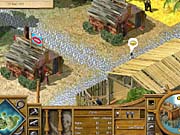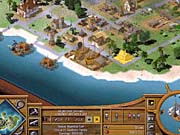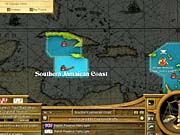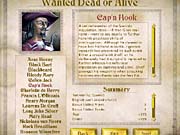Tropico 2: Pirate Cove plays like both an add-on for the original Tropico and an entirely different game. But it doesn't play like a sequel. The things we expect from sequels are absent: Tropico 2 uses the same engine as the original, with a slightly modified interface and new art, and it doesn't refine the gameplay of the original. Instead, developer Frog City has used the basic blueprint of Tropico to build an entirely new game--one that exchanges the rum trade and political maneuvering for Jolly Rogers and eye patches. The pirate theme of Tropico 2 is more than just an aesthetic difference, as the dynamics of the game have been fundamentally changed to accommodate the theme. And though some of the changes are interesting, not all of them are good.

It was easy to overlook some of Tropico's more obvious issues. The game was inventive and gave you many unusual strategic options. As a result, its less successful elements weren't as problematic as they might have been in a worse game. For instance, Tropico gave you the option to be a benevolent dictator or an oppressive tyrant, but the latter wasn't usually a viable option because it was so much easier to just keep your people happy. Tropico 2 doesn't give you this option--most of your residents aren't on your island by choice, so happiness is out of the question.
Instead of managing a small, developing country, Tropico 2 puts you in charge of a secret pirate hideout. You must kidnap workers to create a basic economy of products and services, and then keep them terrified so they won't try to escape. The historical accuracy of the scenario is questionable--did pirates really manage huge, thriving towns and industries? The morality is even more questionable, and the jaunty music and cartoonish graphics can't hide the fact that Tropico 2 could be more accurately named Slave Tycoon. The amoral attitudes of games like Grand Theft Auto III and Postal 2 are denounced, or at least they stick out, and yet the similarly amoral Tropico 2 has somehow not been commented upon, even though executions, kidnapping, slavery, and forced prostitution are the backbone of the game.
Moral questions aside, Tropico 2 has some basic similarities to its predecessor. You must manage a small island community from its inception, building up the basic necessities and then moving into luxuries in order to create a thriving economy. You must build farms to supply food to your workers and then create more-extravagant products such as cigars and rum to keep your employed pirates happy. The difference is your workforce consists entirely of enslaved captives, so money is not much of an issue when creating your infrastructure. Instead, the only significant resource is lumber. But you'll also need iron to make weapons for your pirates, who are the breadwinners on your island hideaway.
Accumulating gold is the primary goal in Tropico 2, but you don't do so by trading the goods you produce on your island. Instead, you do so by outfitting pirate ships and sending them out to loot the high seas. While your workers don't need to be happy--just resigned to their fate or terrified--your pirates do. You must provide them with entertainment and housing, and make them feel as if they're safe from invasion. Entertainment includes brothels, gambling dens, restaurants, and taverns, so the goods you produce are used exclusively to keep these establishments well stocked.

The economic system makes for a somewhat abstract game. All the items you produce are used exclusively for the benefit of keeping your pirates from revolting, but happy pirates doesn't translate directly into monetary gain. Only bigger ships and more experienced pirates can bring you more wealth, and as a result the whole system has less immediate reward than a thriving cigar or rum industry in Tropico.
There are other ways to make money in the game. Your entertainment establishments provide some income, and in addition to snatching riches from the ships they raid, your pirates will be able to take wealthy captives who can be ransomed. This, however, leads to one of Tropico 2's bigger problems--the interface of the original doesn't suitably accommodate some of the new features. Instead, it feels like a new game was just crammed into an old shell.
Ransoming captives is the most egregious example of this: It's just not an easy thing to do. Once your captives are let loose on the island, they wander around at will. To collect the ransom on any one of them, you must issue a "ransom captive" edict and then hunt one of them down. To see where the wealthy captives are, you must navigate a different series of menus altogether. Once you've found one, you must click through three screens to issue the edict and then click on the captive. It's overly complicated and not very intuitive.

You can, however, just pause the game and ransom off captives as they leave the ship. This is the easiest option, but not very wise, as their ransom value increases the longer they are held prisoner. The downside to letting them stay on your island while their value increases is that they will spend all their time in your entertainment establishments, thus taking up room that would be better served in keeping your pirates content. It's in presenting this sort of benefit vs. detriment decision that Tropico 2 is at its strongest. Many of your establishments, for instance, require a certain type of worker, such as a cook or a gunsmith. Unless you've luckily kidnapped one if these in a raid, you must order a ship to go out and find one for you. This means that instead of earning you treasure or a batch of unskilled workers, your ship is occupied with kidnapping a single worker.
You also must balance the happiness of your pirates with the fear of your workers. Some structures, such as the gallows or the interrogation chamber, radiate fear, while others, like the fort or the observatory, help make your pirates feel safe. You can also decorate your island with objects that create order, which is good for captives, or anarchy, which is good for pirates. Unfortunately, these items are prohibitively expensive. A single hanging skeleton costs three times as much as a farmhouse, and decorative objects only work in numbers. So balancing emotions on your island will often cost you more than a brand-new sloop, which may make sense in terms of game balance but just seems illogical in material terms.
Tropico 2 addresses one of the major criticisms of Tropico: Instead of just offering a series of stand-alone scenarios and a sandbox mode, Tropico 2 has a full-fledged campaign. Basically a series of stand-alone scenarios strung together, the campaign takes you through a series of islands, giving you increasingly complicated goals to achieve. The campaign is a good addition, though it could have been much better. Each island will be the subject of a few missions, but the buildings you erect in one mission won't be standing in the next, so they may as well be distinct islands.
The single scenarios are much like those found in Tropico, with distinct goals that require you to achieve a certain level of pirate happiness, a certain level of worker resignation, or a certain amount of wealth. But, as in the original, the sandbox mode is really the heart of the game. You choose a pirate, each with certain bonuses and penalties to his or her management abilities, and then set out to create a thriving island within a predetermined period of time.

Despite all the changes to the gameplay, Tropico 2 looks a good deal like Tropico. But that's not a bad thing--the colorful graphics of Tropico were one of its strengths, and you can zoom all the way in and watch a single inhabitant go about his business, or zoom way out and get a bird's-eye view of your entire island. The zoom levels are a bit extreme, and only one or two levels are very useful, but it's occasionally enjoyable to zoom in and watch your miners or haulers at work. The music, again composed by Daniel Indart, is excellent, blending the Caribbean soundtrack of Tropico with a jauntier buccaneer mood.
It can be fun to get your town up and running and send your pirates out on raids, and learning to balance the diverse requirements of your captives and your pirates is interesting. But fans of Tropico may wish that Frog City had developed a more direct descendant of the original--the mechanics are basically the same, but Tropico 2 is a very different game. And those who like the pirate theme may wish that Frog City had built a new game from scratch, instead of tying itself to the Tropico blueprint. It's a shaky marriage either way, with the pirate game and the town management game constantly fighting for dominance.